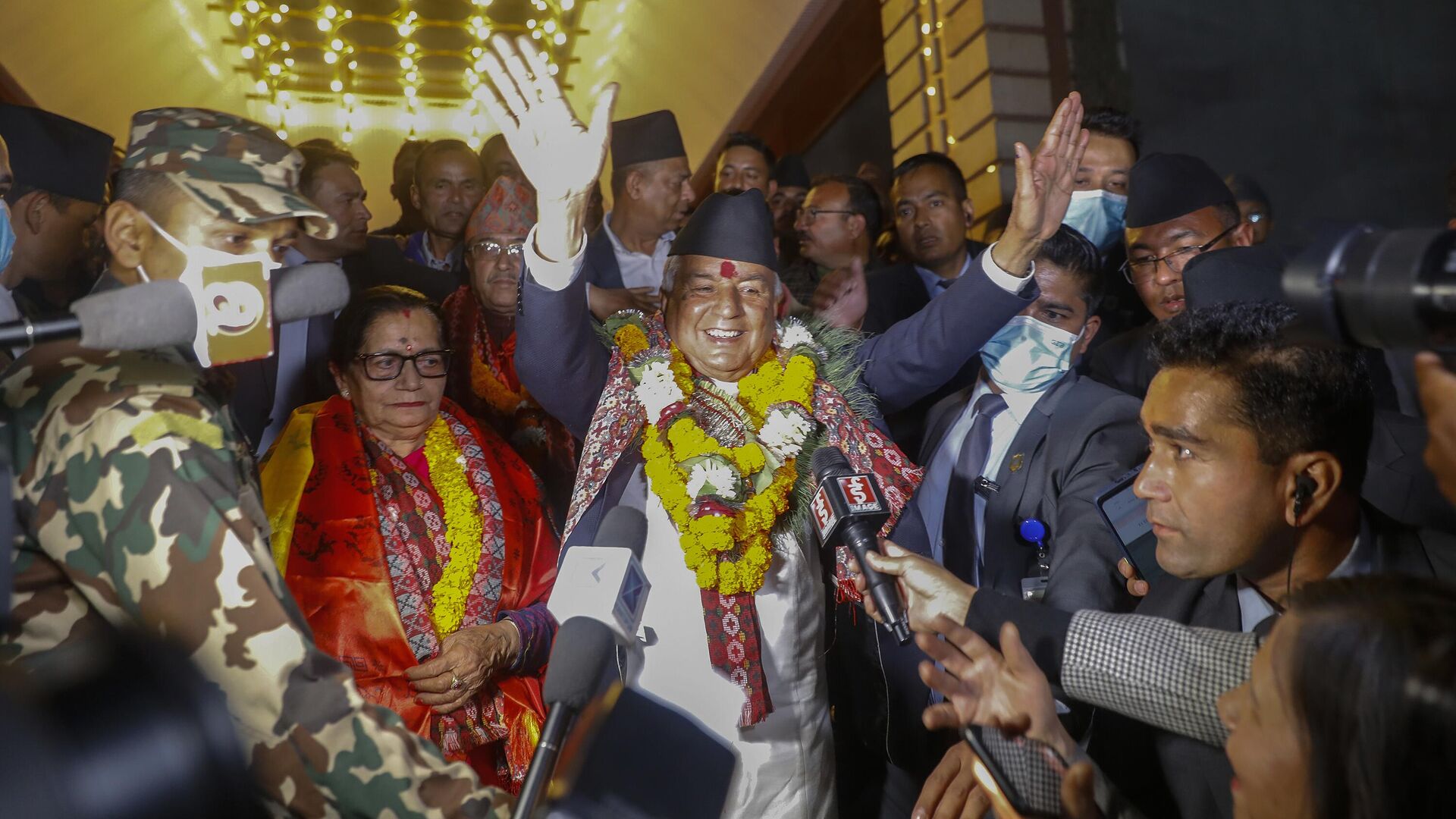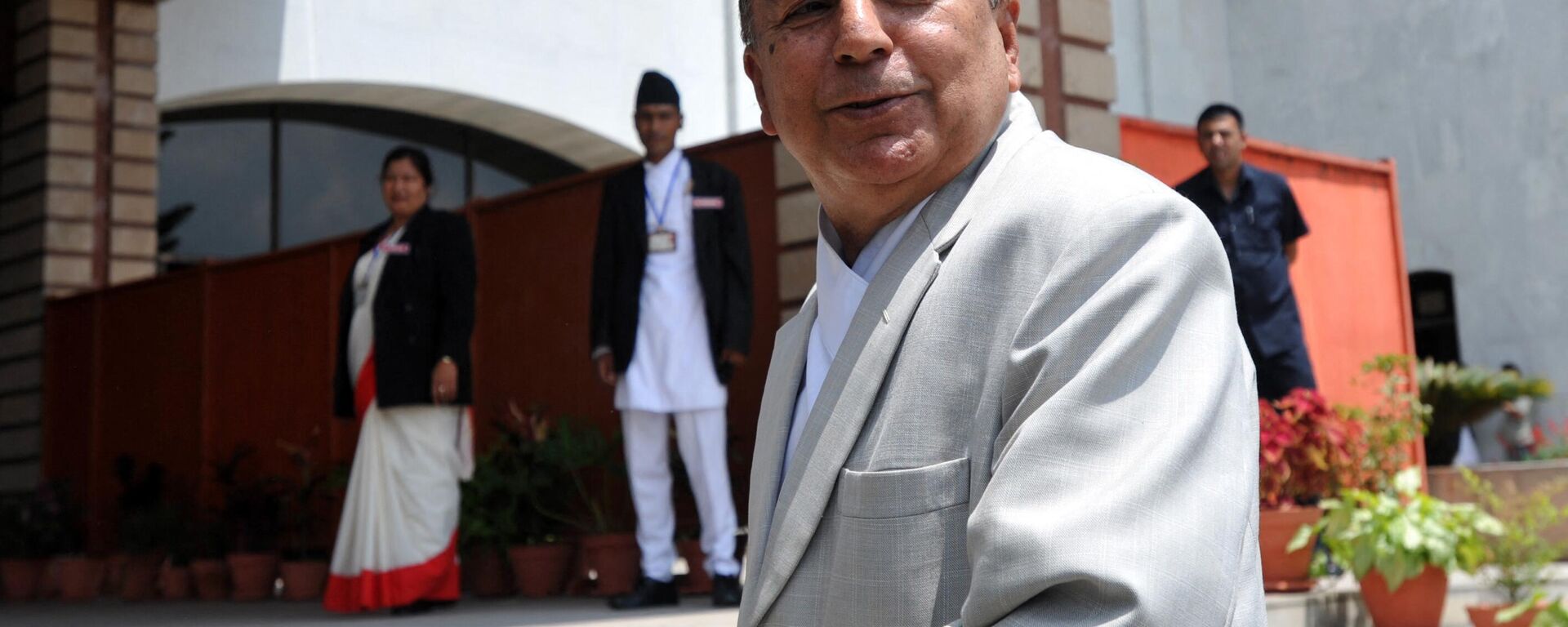https://sputniknews.in/20230315/unstable-nepal-govt-paves-way-for-foreign-interference-experts-1169454.html
Unstable Nepal Gov't Paves Way for Foreign Interference: Experts
Unstable Nepal Gov't Paves Way for Foreign Interference: Experts
Sputnik India
The US has increased its interest in small Asian territories like Nepal, and Bangladesh, and is signing infrastructure and military deals with them.
2023-03-15T15:15+0530
2023-03-15T15:15+0530
2023-03-15T18:13+0530
sputnik opinion
nepal
us
us hegemony
kathmandu
political controversy
south asia
the dalai lama
tibet
tibetan buddhism
https://cdn1.img.sputniknews.in/img/07e7/03/0f/1173905_0:156:3001:1844_1920x0_80_0_0_3d3e2a78157e011e78e9dc01a90c4ee6.jpg
Kathmandu has witnessed various high-profile official visits from the US over past months.Victoria Nuland, US deputy secretary of state for political affairs, visited Nepal from January 29-30, followed by Samantha Power, the US Agency for International Development (USAID) chief, from February 7-9.Meanwhile, on February 13, US Deputy Assistant Secretary of South and Central Asian Affairs Afreen Akhter arrived in the Himalayan city.Many other US officials have likewise shown interest in visiting Nepal, including US National Security Council's Senior Director for South Asia Rear Admiral Eileen Laubacher and Central Intelligence Agency (CIA) Director William J Burns. However, Kathmandu blocked Burns' visit, citing the presidential election.US Extending Grip Over South AsiaThe US has similarly extended economic help and investment to the Himalayan country in recent years, whose per capita income is a little over $1,000.During her visit, Nuland said that the US would invest more than $1 billion in various programs, from clean energy to small businesses led by women and minorities. Similarly, Power also announced a $58.5 million grant.Meanwhile, last year, Nepal's parliament ratified a $500 million Millennium Challenge Corporation (MCC) infrastructure grant by the US after a huge debate.However, in 2022, Nepal blocked the State Partnership Programme (SSP) with the US after the Nepal Army asserted that it would not accept a deal that goes against the country's non-aligned foreign policy.The disclosed six-page draft US proposal triggered a debate and caused backlash in Nepal for the possible US military presence in the country, which, many warned, contradicted Nepal's non-aligned foreign policy.The US Embassy claimed that the SPP draft circulating online was "fake".Why Did US Develop Such Interest in Nepal?Speaking with Sputnik, Sanjay Upadhya, a US-based Nepali author and analyst on Nepal's foreign affairs, said that the US "is interfering with small territories, which, in fact, wasn't its interest in the past. It could be as the United States is locked in competition with countries like China and Russia — and its situation with small countries is reminiscent of the Cold War."According to Upadhya, the US is mainly interested in Nepal because it can "interfere in between China-Tibet.""All US officials have stressed that Nepal needs to avoid coercive diplomacy from China and maintain an independent foreign policy. They all said that the Himalayan nation should protect its national sovereignty while dealing with neighbors," he stressed.The Tibet Issue and Dalai Lama's SuccessionBuddhist spiritual leader Dalai Lama is considered synonymous with Tibet.As the Dalai Lama grows old, he needs to choose his new successor. The 87-year-old Lama has spoken about the possibility of his successor coming from a "free country and could be a female."Whoever selects the Dalai Lama's next successor, Nepal's acceptance of a new face holds immense significance since Lord Buddha was reportedly born in Nepal, and the country has a sizeable population of Buddhists — up to 10 percent."Nepal has a long and open border with Tibet. And Tibet is a very unstable part of the Chinese periphery border. And, as the issue of the Dalai Lama's succession is coming up in the near future, Nepal would be a lynchpin of its Tibet policy," Upadhya stressed."Nepal also has the second largest Tibetan diaspora refugee population. And with the Dalai Lama's succession coming up, they want to maintain that there is no instability coming to Tibet via Nepal," he said.Geographically, Nepal is surrounded on three sides by India and on the fourth side, by China.Upadhya said that despite the ideological difference between India and China, both want to ward off external influence on Nepal, including the US. Both may have different reasons, but they seem to be cooperating on issues related to Nepal.Nepal Political CrisisDue to 'flawed' democracy in Nepal, external agents, including the US, India and China, are making ways in the country's policy, experts told Sputnik.Sanjay Sharma Poudel, a Nepal-based foreign affairs expert, says that "for the past three decades, we do not have any stable government, especially since 2006."Indeed, there have been 28 prime ministers since 1990, and none of them completed full five-year tenure as a prime minister, several of them were even re-elected for the post. In 2006, Nepal abolished its 239-year-old monarchy and turned into a secular republic, creating seven federal provinces."Nepal has been struggling to maintain a stable state based on ethnic inclusiveness through federalism, secularism, and republicanism. Now, political instability is fostering geopolitical transitions," Poudel said.As the US has said that it will invest in multiple infrastructures and economics in Nepal, Poudel feels, "If we need foreign investment from other countries, we need to see the viability of those projects. Most of the airports in the country are non-functional, and making new airports — how will we pay the interest?""There is a risk of that in the longer term. Therefore, I think there is a larger need for Nepal and for political rest to balance the political meet with the economic," Poudel added.
https://sputniknews.in/20230310/expect-less-drama-from-new-president-expert-on-paudel-being-voted-to-top-post-1120945.html
nepal
us
kathmandu
south asia
tibet
Sputnik India
feedback.hindi@sputniknews.com
+74956456601
MIA „Rossiya Segodnya“
2023
Deexa Khanduri
https://cdn1.img.sputniknews.in/img/07e6/0c/13/138923_52:0:533:481_100x100_80_0_0_cadf23d341691fc65ff2b22fd1afe584.jpg
Deexa Khanduri
https://cdn1.img.sputniknews.in/img/07e6/0c/13/138923_52:0:533:481_100x100_80_0_0_cadf23d341691fc65ff2b22fd1afe584.jpg
News
en_IN
Sputnik India
feedback.hindi@sputniknews.com
+74956456601
MIA „Rossiya Segodnya“
Sputnik India
feedback.hindi@sputniknews.com
+74956456601
MIA „Rossiya Segodnya“
Deexa Khanduri
https://cdn1.img.sputniknews.in/img/07e6/0c/13/138923_52:0:533:481_100x100_80_0_0_cadf23d341691fc65ff2b22fd1afe584.jpg
us in nepal, victoria nulan nepal visit, kathmandu, samantha power, political crisis in nepal, us interest in nepal, us hegemony in south asia, us interests in south asia, us expansionism,
us in nepal, victoria nulan nepal visit, kathmandu, samantha power, political crisis in nepal, us interest in nepal, us hegemony in south asia, us interests in south asia, us expansionism,
Unstable Nepal Gov't Paves Way for Foreign Interference: Experts
15:15 15.03.2023 (Updated: 18:13 15.03.2023) Deexa Khanduri
Sputnik correspondent
The US has recently boosted efforts to spread its influence in small South Asian nations - including Nepal and Bangladesh - by signing infrastructure and military deals.
Kathmandu has witnessed various high-profile official visits from the US over past months.
Victoria Nuland, US deputy secretary of state for political affairs, visited Nepal from January 29-30, followed by Samantha Power, the US Agency for International Development (USAID) chief, from February 7-9.
Meanwhile, on February 13, US Deputy Assistant Secretary of South and Central Asian Affairs Afreen Akhter arrived in the Himalayan city.
Many other US officials have likewise shown interest in visiting Nepal, including US National Security Council's Senior Director for South Asia Rear Admiral Eileen Laubacher and Central Intelligence Agency (CIA) Director William J Burns. However, Kathmandu blocked Burns' visit, citing the presidential election.
US Extending Grip Over South Asia
The US has similarly extended economic help and investment to the Himalayan country in recent years, whose per capita income is a little over $1,000.
During her visit, Nuland said that the US would invest more than $1 billion in various programs, from clean energy to small businesses led by women and minorities. Similarly, Power also announced a $58.5 million grant.
Meanwhile, last year, Nepal's parliament ratified a $500 million Millennium Challenge Corporation (MCC) infrastructure grant by the US after a huge debate.
However, in 2022, Nepal blocked the State Partnership Programme (SSP) with the US after the Nepal Army asserted that it would not accept a deal that goes against the country's non-aligned foreign policy.
The disclosed six-page draft US proposal triggered a debate and caused backlash in Nepal for the possible US military presence in the country, which, many warned, contradicted Nepal's non-aligned foreign policy.
The US Embassy claimed that the SPP draft circulating online was "fake".
Why Did US Develop Such Interest in Nepal?
Speaking with Sputnik,
Sanjay Upadhya, a US-based Nepali author and analyst on Nepal's foreign affairs, said that the US "is interfering with small territories, which, in fact, wasn't its interest in the past. It could be as the United States is
locked in competition with countries like China and Russia — and its situation with small countries is reminiscent of the Cold War."
"Speaking particularly of Nepal, the United States has enlisted Nepal as part of it within its Indo-Pacific strategy. And, its development programs like MCC, have political and security undertones," he stated.
Sanjay Upadhya
A US-based Nepali author and analyst on Nepal's foreign affairs
According to Upadhya, the US is mainly interested in Nepal because it can "interfere in between China-Tibet."
"All US officials have stressed that Nepal needs to avoid coercive diplomacy from China and maintain an independent foreign policy. They all said that the Himalayan nation should protect its national sovereignty while dealing with neighbors," he stressed.
The Tibet Issue and Dalai Lama's Succession
Buddhist spiritual leader Dalai Lama is considered synonymous with Tibet.
As the Dalai Lama grows old, he needs to choose his new successor. The 87-year-old Lama has spoken about the possibility of his successor coming from a "free country and could be a female."
However, Beijing has clarified that Chinese leader Xi Jinping and his colleagues will choose the Dalai Lama's successor and "the reincarnation must comply with Chinese laws and regulations, follow rituals and historic conventions."
Whoever selects the Dalai Lama's next successor, Nepal's acceptance of a new face holds immense significance since Lord Buddha was reportedly born in Nepal, and the country has a sizeable population of Buddhists — up to 10 percent.
"Nepal has a long and open border with Tibet. And Tibet is a very unstable part of the Chinese periphery border. And, as the issue of the Dalai Lama's succession is coming up in the near future, Nepal would be a lynchpin of its Tibet policy," Upadhya stressed.
"Nepal also has the second largest Tibetan diaspora refugee population. And with the Dalai Lama's succession coming up, they want to maintain that there is no instability coming to Tibet via Nepal," he said.
Geographically, Nepal is surrounded on three sides by India and on the fourth side, by China.
Upadhya said that despite the ideological difference between India and China, both want to ward off external influence on Nepal, including the US. Both may have different reasons, but they seem to be cooperating on issues related to Nepal.
Due to 'flawed' democracy in Nepal, external agents, including the US, India and China, are making ways in the country's policy, experts told Sputnik.
Sanjay Sharma Poudel, a Nepal-based foreign affairs expert, says that "for the past three decades, we do not have any stable government, especially since 2006."
Indeed, there have been 28 prime ministers since 1990, and none of them completed full five-year tenure as a prime minister, several of them were even re-elected for the post. In 2006, Nepal abolished its 239-year-old monarchy and turned into a secular republic, creating seven federal provinces.
"Nepal has been struggling to maintain a stable state based on ethnic inclusiveness through federalism, secularism, and republicanism. Now, political instability is fostering geopolitical transitions," Poudel said.
"A weak government will always give space to foreign interference, and this is happening in Nepal," Poudel said when asked why the US is making its way so easily. "It is time for Nepal to exercise prudence and national consensus with the external world."
As the US has said that it will invest in multiple infrastructures and economics in Nepal, Poudel feels, "If we need foreign investment from other countries, we need to see the viability of those projects. Most of the airports in the country are non-functional, and making new airports — how will we pay the interest?"
"There is a risk of that in the longer term. Therefore, I think there is a larger need for Nepal and for political rest to balance the political meet with the economic," Poudel added.



